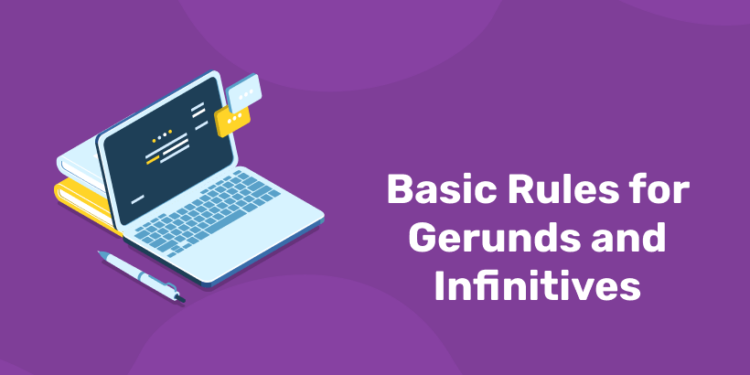Table of Contents
The Infinitive and Gerunds are two different verb forms. Before talking about the basic rules related to the two, we should know something about the verbs. In this article, we will discuss the basic rules related to the Gerunds and Infinitives.
Gerunds and Infifnitives : An Overview
An infinitive is the form of a verb that has “to” at the start. For instance, “to do,” “to rest,” “to love” and “to create.” It is the simplest and easiest structure of the verb that you have to change to suit sentences.
For instance, “He sleeps” no longer has the infinitive of the verb “to sleep.” Instead, it has been conjugated into the simple present third-person form of the verb “to sleep”: sleeps.
Infinitives are easy! right? And how about the gerunds?
Gerunds are created by adding “-ing” to the verb: “walking,” “drawing,” and “swimming.” But they are not the “-ing” verb forms that you can see in the present or past continuous tense. They look identical, but gerunds are verb forms used as nouns.
The Basics of Gerunds and Infinitives
1: Which of the sentences below is grammatically correct?
Gerund: VERB + -ING (eating, going, studying)
Infinitive: TO + BASE VERB (to drink, to go, to study)
As we already said, the gerund is the present participle (-ing) form of the verb. And an infinitive is to + the base verb (the verb with no ending). Both gerunds and infinitives are action words (i.e., verbs) in meaning, but they function as nouns in the sentence. They always bring a noun position: a subject or an object of the main verb. A gerund or infinitive is never the main verb (e.g., I sleeping and I to study are incorrect).
- Skiing is fun.
- I like hiking.
- I need to study.
Even when the gerund or infinitive is the object of a sentence, it is typical for a second object to follow the gerund or infinitive because of its “verb” meaning.
- I enjoy watching movies.
- I don’t want to study English.
- I asked my friend to help me.
Spoken English Course for Guaranteed Confidence and Career Growth
Spoken English Course by Entri App: Enhance your communication skills, gain certification, and boost your career with confidence.
Join Now!5 Simple Rules to the Use of Gerunds and Infinitives to Become a Master
Rule 1: Gerunds can be employed as a subject of a sentence.
Take a look at some instances.
Walking is good for your health.
Making friends has become more complicated since I moved to a new city.
Becoming a millionaire is a goal of many young people today.
Here, the gerunds (in bold) are part of the sentence subjects (“listening,” “making friends,” “becoming a millionaire”). All three sentences sound like normal, and everyday English.
Now try to read these two sentences:
“To be or not to be—that is the question.”
“To mourn a mischief that is past and gone is the next way to draw new mischief on.”
(Both sentences are quotes from William Shakespeare’s creations.)
They sound formal, don’t they? They are poetic, right? Shakespeare is one of the most renowned authors of all time, but his English is famously hard to understand. And that’s because it is literature. It is proper and it is art.
In these two quotes, the infinitives “to be” and “to mourn” are employed as the sentence subjects.
So, it is feasible to use both infinitives and gerunds as subjects, but gerunds are much more generally used as subjects. Just pay attention to how the intention reflects on the tone and meaning of your sentences.
Download the ENTRI Learning App to Join the Best Online Spoken English Course!
Rule 2: Both gerunds and infinitives can be employed as objects of a sentence.
You may say:
“I enjoy sketching.”
You may also say:
“Yesterday, I decided to sketch.”
Both sentences are correct here, but one includes an infinitive as the object and the other includes a gerund as the object.
What is the difference?
It’s the verbs that forego (come before) the object! Some verbs need a gerund and some will need an infinitive. In the above instances, we can notice that the formula is “enjoy” + [gerund] and “decide” + [infinitive].
With practice, you will be capable to remember which one is which.
Here are a few instances of verbs that ought to be followed by an infinitive:
- agree: I agreed to go to a movie with my friend.
- decide: The president decided not to participate in the meetings.
- deserve: Everyone deserves to be appreciated.
- expect: I expect to know my exam result by tomorrow.
- hope: We were hoping to avoid a rush by leaving early.
- learn: She learned not to trust anyone.
- need: He needs to learn how to dance.
- offer: I offered to help my sister with cooking.
- plan: We are planning to watch a drama tonight.
- promise: My brother promised to find the time to help me move.
- seem: They seem to be lost.
- wait: I cannot wait to see my daughter.
- want: I don’t want to go to school yet.
There are lots of verbs that need an infinitive after. You will learn them innately, as you progress in your English studies.
And here are a few instances of verbs that ought to be followed by a gerund:
- admit: They admitted changing the program.
- Advice: I advise proceeding (moving forward) with notification.
- avoid: He avoided looking me in the eye.
- consider(think about): I considered staying silent, but I had to tell him.
- deny: I denied knowing about her secret.
- involve: The lesson involved writing three tests.
- mention(say something): He mentioned seeing my sister at a baseball game.
- recommend: I recommend practicing grammar and infinitives.
- risk: Don’t risk losing your career!
- Suggestion: I suggest reading more short stories in English.
Rule 3: Infinitives should be employed after many adjectives.
Here are three model sentences that will help to explain this rule:
It is not easy to graduate from a college.
It is necessary to speak fluent English to work in an office.
It is wonderful to have close pets.
When you explain something with an adjective (highlighted in the examples above), an infinitive should pursue (in bold). Employing gerunds here would be incorrect.
But remember! If you want to create that object into a subject (see Rule 1), a gerund should be used:
Graduating from college is not easy.
Speaking English is necessary to work in an office.
Having close pets is wonderful.
How else do you understand if an adjective should be pursued by an infinitive? The construct “too + [adjective]” is another method to tell!
For instance:
This top is too big to wear.
This bike is too expensive to buy.
And the same is correct about “[adjective] + enough”:
My son is not tall enough to ride this cycle.
The lesson was detailed enough to widen his learning base.
This rule is useful enough to comprehend the usage of infinitives!
Want to Join for a Best Online English Speaking Course? Sign Up for ENTRI Learning App!
Rule 4: Only infinitives are employed after certain verbs followed by nouns or pronouns guiding a person.
“We asked him not to go.”
In this sentence structure, “we” is the subject, the verb is “asked”, and “him” is the objective form of the pronoun “he.” You must use an infinitive (“to go”), never a gerund, after specific verbs followed by nouns or pronouns directed to people.
To realize this rule, you will have to learn verbs that take an object and an infinitive in this context.
Begin with these models. The objects (nouns and pronouns) are highlighted. Notice how the highlighted objects are all followed by infinitives.
- ask: Can I ask you to assist me with something?
- expect: I never expected him to become renowned.
- hire(give a job to someone): Did the organization hire you just to sit in your office?
- invite: I invited a friend to follow the ceremony.
- order: He ordered the child to stay at home.
- remind: Please remind me to wash the clothes.
- require: The test required her to concentrate fully.
- teach: That will teach you to follow the directions!
- tell: Who told you to go there?
- urge: They urged me to continue my study.
- warn: I am warning you not to do that!
Rule 5: Only gerunds are employed after prepositions (with one exception).
Regard this sentence:
I talked her out of taking that position.
Here, the gerund “taking” pursues the preposition “of.”
Prepositions can obey any word, be it a noun, a pronoun, a verb, or an adjective. In the instances mentioned below, the prepositions are highlighted, pursued by the gerunds in bold.
A preposition that follows a noun:
Stories about growing up are popular among teenagers.
I have an interest in becoming a singer.
A preposition that follows a pronoun:
I forgive you for not telling the fact.
A preposition that follows a verb:
He is thinking about trying martial arts.
She looks forward to meeting her cousins.
A preposition that follows an adjective:
I am wary of going alone.
My sister is scared of flying.
There is one exception. Thankfully, it should be easy to remember!
The exception
“But” is a short word that joins two clauses of a sentence. It is called a conjunction. Sometimes, “but” can also play a part in a preposition. When “but” is used as a preposition, it is exact in meaning as “except.”
If “but” or “except” are used like this, they ought to be obeyed by an infinitive:
I had no option but to follow her.
(I had to follow her.)
Masha made no stops on the way except to get gas.
(Mary only stopped to get gas.)
There is nothing left for me to do but to collect my things and go.
(I only have to collect my things and go.)
You may not see “but” and “except” employed this way often. Just observe the rule of gerunds after prepositions, and you will get it straight most of the time!
Gerunds and infinitives may be disorganized, but they make your English speech more varied and bright. It is very reasonable to study them and practice using them perfectly. The more you catch gerunds and infinitives in your study of the English language, the more comfortable it will get.
You can learn more English Grammar and Spoken English through our course “English Padikkyam with Inverted Coconut” offered by the ENTRI Learning App.












